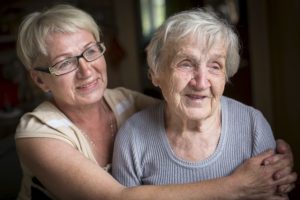Fall risk is one of the most serious risks that your aging parent faces throughout their later years. According to the Centers for Disease Control and Prevention, falls are the leading cause of non-fatal injuries and a leading cause of death among senior adults, with more than 29 million suffering falls each year and a large percentage of those ending up in the hospital for care. A single fall can result in injuries that diminish your parent’s health, safety, functionality, and quality of life for the rest of their later years, and can even shorten their life expectancy.

As a family caregiver, helping your parent to reduce the risk of these falls is one of the most important things that you can do to protect your senior. Since balance problems are the root of the vast majority of falls, this starts with understanding what could be affecting your senior’s balance.
Some of the issues that could be affecting your senior’s balance include:
• Inner-ear problems. A large percentage of balance problems are related to issues with the inner ear, also referred to as vestibular system problems. Abnormalities in this system can create a sense of dizziness, unsteadiness, or floating of the head, particularly in the dark.
• Nerve damage. A variety of health issues and challenges, including diabetes, can lead to nerve damage in the legs and feet. Also referred to as peripheral neuropathy can make it difficult to walk with stability.
• Vision problems. Issues with your parent’s vision can lead to confusion in the information that their eyes receive, leading to difficulty with their balance as well as greater risk of instability and tripping.
• Joint and muscle problems. The strength, flexibility, and range of motion of the joints and muscles are critical to maintaining balance. If your parent is dealing with arthritis, trauma, or other issues related to these systems, they can struggle with compromised balance.
• Medications. If your aging parent is like many seniors, they are taking one or more prescription medications. Many of these can result in problems with balance, dizziness, and unsteadiness.
• Neurologic conditions. Both Parkinson’s disease and Alzheimer’s disease have been linked to balance problems. Certain psychiatric disorders, though not necessarily neurologic in origin, can result in dizziness as well.
Starting homecare for your aging parent can be one of the best decisions that you make for them in the course of your caregiver journey. A homecare services provider can be with your parent on a customized schedule to ensure that they have access to all of the care, support, and assistance that they need while still fostering a sense of independence and keeping you at the front of their care routine. Through a highly personalized set of services, this homecare provider can address your parent’s individual challenges, limitations, and needs in a way that is right for them.
This helps them to stay safe, healthy, comfortable, and happy, and to pursue a lifestyle that is as active, engaged, and fulfilling as possible as they age in place. As a family caregiver this gives you confidence and peace of mind that your parent is getting everything that they need both when you are with them and when you are not able to be.
Sources: http://vestibular.org/BAW
https://www.cdc.gov/media/releases/2016/p0922-older-adult-falls.html
http://www.mayoclinic.org/diseases-conditions/balance-problems/home/ovc-20166187
If you or an aging loved one are considering Homecare Services in Dover MA, or anywhere in Eastern Massachusetts, please call the caring staff at CARE Resolutions – (508) 906-5572.
- Adapting Meals for Seniors with Chewing or Swallowing Difficulties - November 20, 2024
- How Playing Games Helps Alzheimer’s Patients - November 5, 2024
- What Seniors Should Know About Prescription Medicines - October 17, 2024



